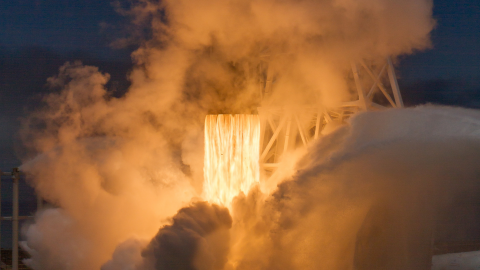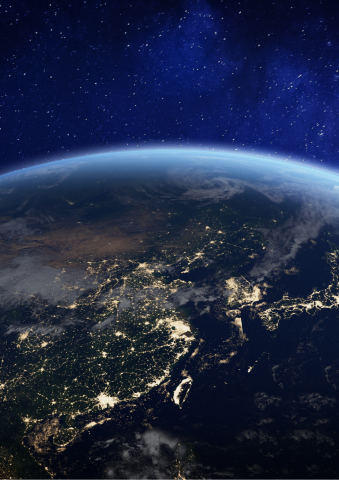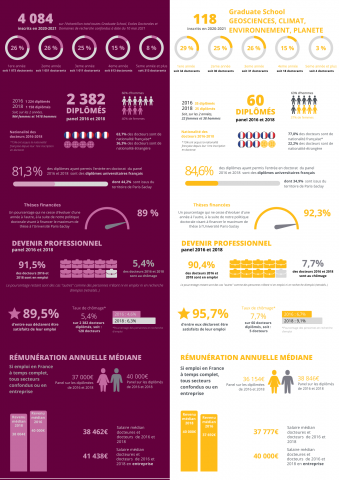
PhD Program in Earth, Climate, Environment and Planetery Sciences - Graduate School Earth, Climate, Environment and Planetery Sciences
The Doctoral Program in Earth, Climate, Environment and Planetary sciences provide students a cutting edge training through research projects concerning the superficial envelops (hydrosphere, atmosphere) of the Earth and the other planets and their interactions with the subsurface in a context of strong societal challenges (climate change, pollution, natural resources…) using multiple approaches from field work to space missions and numerical modelling.
Geosciences / Environment / Planets / Pollution / Natural resources management / Greenhouse gases / Paleoclimate / Geochemistry / Geophysics / Geomorphology / Geodynamic / Biogeosciences / Space exploration / Climate change / Remote sensing / Climate modelling / Instrumentation.
Program content
- Environmental Sciences in Ile-de-France (SEIF)
- Mechanical and Energy Sciences, Materials and Geosciences
- Astronomy and Astrophysics for Paris Area
Doctoral School of ENVIRONMENTAL SCIENCES IN ILE-DE-FRANCE (SEIF)
The doctoral school covers the multidisciplinary fields related to the understanding of the physical, chemical and biological equilibrium of the terrestrial environment such as
- study of the climate and its variations at all scales of time and space,
- dynamics and thermodynamics of the atmosphere and the ocean,
- radiative transfer,
- functioning of the continental and marine biosphere,
- biogeochemical cycles,
- physical chemistry of air, water and soil pollution,
- experimental developments and techniques related to the observation of remote sensing.
Learn more about the doctoral school SEIF
Doctoral School of MECHANICAL AND ENERGY SCIENCES, MATERIALS AND GEOSCIENCES (SMEMAG) - Geosciences division
The "Astronomy and Astrophysics of Ile-de-France" Doctoral School offers graduates from physics and mathematics studies training in and through research in the vast interdisciplinary field of astronomy and all its techniques of observation, measurement and calculation.
The Doctoral School offers physicists and mathematicians training in and through research in the vast interdisciplinary field of astronomy and all its methods of observation, measurement and calculation. It covers a field whose development is considerable and unceasing: discovery of extrasolar planets, renewal of cosmology at the interface with particle physics, development of astrochemistry, in situ exploration of the solar system, space navigation, planetology at the interface with the sciences of planet Earth. Powerful observation tools are being prepared, both in space and on the ground, affirming the place of Europe, using a wide variety of advanced technologies (optics, metrology, cryogenics, automation, etc.).
Learn more about the SMEMAG doctoral school
Doctoral School of ASTRONOMY AND ASTROPHYSICS OF ILE-DE-FRANCE (AAIF)
L’École Doctorale "Astronomie et Astrophysique d’Ile-de-France" offre aux diplômés issus d’études de physique et de mathématiques une formation à, et par la recherche dans le vaste domaine interdisciplinaire de l’astronomie et de toutes ses techniques d’observation, de mesure et de calcul.
L’École doctorale propose aux physiciens et mathématiciens une formation à et par la recherche dans le vaste domaine interdisciplinaire de l’astronomie et de toutes ses méthodes d’observation, de mesure et de calcul. Elle couvre un champ dont le développement est considérable et incessant : découverte des planètes extrasolaires, renouveau de la cosmologie à l’interface de la physique des particules, développement de l’astrochimie, exploration in situ du système solaire, navigation spatiale, planétologie à l’interface avec les sciences de la planète Terre. De puissants outils d’observation sont en préparation, aussi bien dans l’espace qu’au sol, affirmant la place de l’Europe, faisant appel à une grande diversité de technologies avancées (optique, métrologie, cryogénie, automatique..).
- Laboratoire des Sciences du Climat et de l’Environnement (LSCE) CEA/CNRS/UVSQ
- Laboratoire Atmosphère et Observations Spatiales (LATMOS) CNRS/UVSQ/SU
- Géosciences Paris-Saclay (GEOPS) UPSaclay/CNRS
- Département Physique, Instrumentation, Environnement, Espace (DPHY) ONERA
- Département Optique et Techniques associées (DOTA) ONERA
PhD students admitted to the Phd program will have a public law doctoral contract. The duration of the contract is 3 years. The contractual Phd students are full-time employees with the sole or main mission of carrying out their doctoral project. They may also be entrusted with complementary missions of teaching, scientific mediation, valorization or expertise.
Possible employers* for PhD students under contract to the program are :
- Université Paris-Saclay (Faculties of Sciences of Orsay)
- University of Versailles Saint Quentin en Yvelines
- CEA
- ONERA
- CNRS
- CNES
* This list remains to be completed or specified
ED ENVIRONMENTAL SCIENCES OF ILE-DE-FRANCE (SEIF)
Students are accompanied throughout their doctoral studies. At the beginning of their thesis, they meet with the director of the ED, or one of his or her assistants, to remind them of their rights and duties. At the end of the first and second year, the PhD student presents the progress of his or her work to this committee, which advises him or her on the continuation of the thesis. A sponsor is also designated in the laboratory at the beginning of the thesis. This person can be called upon at any time by the PhD student in case of difficulties that cannot be solved or that involve the thesis director.
Doctoral days are organized each year by the ED. First year students present their thesis topics. These days are an opportunity for PhD students from the different laboratories of the ED to meet each other, to get to know each other better and to create connections.
ED ASTRONOMY AND ASTROPHYSICS OF ILE-DE-FRANCE (AAIF)
PhD students are welcomed at the beginning of their thesis during a meeting of newcomers (first year students) by the office and former PhD students of the doctoral school. A supervision is then organized throughout the duration of the thesis by the thesis committee. One meeting is organized per year with the participation of the director and a deputy director of the doctoral school in the second year.
The PhD students of the doctoral school organize and participate in the annual Elbereth conference, which gives them the opportunity to meet and discuss the different research themes covered by the doctoral school.
ED MECHANICAL AND ENERGY SCIENCES, MATERIALS AND GEOSCIENCES (SMEMAG) - Geosciences division
Under construction
The PhDs of the GS "Geosciences, Climate, Environment, Planets" pursue careers in academia or in the private sector in the fields of Earth observation, monitoring, protection and management of the environment, exploitation of oceans or continental surfaces. In the non-academic sector, they work in companies ranging from start-ups (The Climate data factory, LBMS Rockwinds, HD-Rain), to corporations (eLICHENS, ACRI-ST, SANOFI, KEOPSYS, EDF, SUEZ...) and organizations related to the environment and geosciences (AirParif, Bureau de Recherche Géologique et Minière, Institut de Radioprotection et de Sureté Nucléaire, Centre d'études et d'expertise sur les risques, l'environnement, la mobilité et l'aménagement, INRAE...). .
Three years after their thesis defense, on December 1, 2019, 93.3% of PhDs were employed. 6.7% were unemployed.
To help PhD students refine their professional projects, meetings with GS alumni working in the private and academic sectors are organized every year.
How to be admitted to the doctoral program in Earth, Climate, Environment and Planetary sciences ?
Find below the different steps to apply to the Geosciences, Climate, Environment, Planets doctoral program
Recruiting sectors
The recruitment of PhD students for the "Graduate School Geosciences, Climate, Environment, Planets" is open to students of the Earth Sciences, Planets, Environment major at Paris-Saclay, but also to graduates of other masters programs at the University of Paris-Saclay, in France and abroad.
The main research fields targeted are those developed in the "Geosciences, Environment, Planets" graduate school, but applications from students from other disciplines (Physics, Chemistry, Engineering Sciences, Biology, etc.) are encouraged, as they contribute to the enrichment and broadening of the multidisciplinary research themes of the Graduate School.
Evaluation criteria
- the academic level of each candidates
- the adequacy of skills and knowledge to deal with the proposed subject
- the elements of motivation for and appropriation of the subject
- contextual elements: international agreements, priority placed by a laboratory on a given subject (when and only when they are explained in the description of thesis subjects)
The jury also ensures that the students are well distributed among the various laboratories or research teams affiliated with the ED.

2021 Calendar - Candidates
- Publication of thesis topics: mid-March at the latest.
- Submission of applications: end of April (SMEMAG/AAIF) to mid-May (SEIF)
- Selection of candidates for auditions: May (early May for AA, mid-May for SMEMAG and early June for SEIF)
- Auditions: late May to mid-June (week 21-23)
- Admissions: early July (week 27) at the latest, some results being given just after the auditions.
How to apply to ED AAIF ?
Everything is clearly explained on the following page: https://ecole-doctorale.obspm.fr/spip.php?rubrique88
The jury of the competition is composed of members of the doctoral school office and external guests bringing a complementary expertise. Its composition is published each year on the doctoral school's website.
Calendar 2024 - Candidates
- Wednesday January 31, 2024
Thesis submission deadline - Friday April 19, 2024
Closing date for submission of thesis topics on ADUM - May 28, 29 and 30 - June 3 and 4, 2024
Audition of candidates - Friday June 7, 2024
Announcement of results
How to apply to ED SMEMAG ?
The procedure of the competition is detailed on the ED website : https://www.universite-paris-saclay.fr/ecoles-doctorales/sciences-mecaniques-et-energetiques-materiaux-et-geosciences-smemag#edit-group-theses
The jury is composed of the members of the ED Council, except for the PhD student representatives.
Calendar 2024 - Candidates
- Thursday, February 29, 2024
Closing date for thesis submissions - Thursday, April 25, 2024
Closing date for ADUM applications - Wednesday May 29 to Friday May 31, 2024
Audition of candidates - Date to be defined
Announcement of results
How to apply to ED SEIF ?
Candidates contact by e-mail the thesis directors of their choice in order to present their application and to discuss the subject of the thesis
Each thesis director organizes at least one interview with the candidate and sends by e-mail to the laboratory director the file he/she has selected.
The application file is described under 'Documents to be provided' here
The jury is composed of the members of the ED Council.
Calendar 2024 - Candidates
- Friday, February 26, 2024
Closing date for thesis submissions - Sunday May 12, 2024
Closing date for ADUM applications - Wednesday June 12 and Thursday June 13, 2024
Audition of candidates - Tuesday June 18, 2024
Announcement of results
Communication tools
THE EMPLOYMENT STATUS OF GRADUATE SCHOOL EARTH, CLIMATE, ENVIRONMENT AND PLANETARY PHDS AS OF DECEMBER 1, 2019
